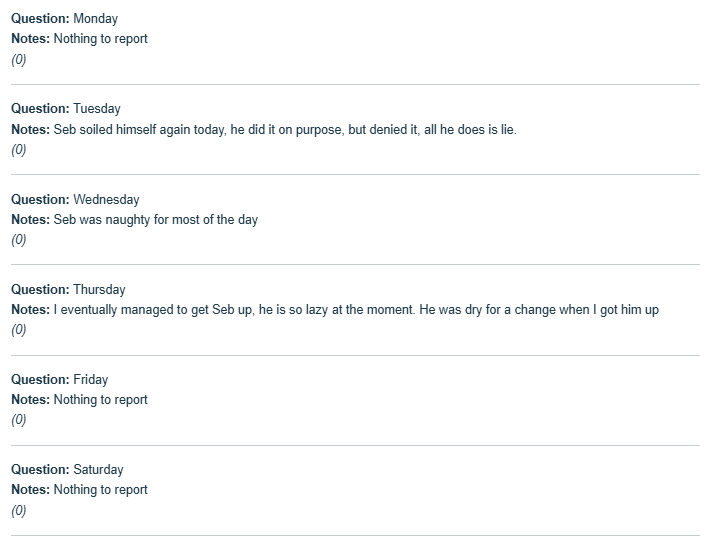Our foster carers can be nothing short of amazing. Fostering is not an easy task. Some of our carers have extremely busy households, often with many daily challenges to face while we care for our children and young people.
It’s no surprise that the carer logs can feel like an admin task that shouldn’t (or can’t) take priority.
A large part of my role here at UK Fostering is supporting carers with their logs, and I often hear similar feedback:
- My young person does the same thing every day, I don’t know what to write
- My young person is so routined, the logs feel pointless.
- My young person is very settled, I have no concerns. There is very little to write
- I struggle to find time to write the logs, I feel so busy all the time.
- I get distracted when I write the logs
- The logs feel like a chore
- Logs used to be easier, I used to just email the SSW. I don’t like the new system
I’m the Quality Assurance Officer here at UK Fostering. A large part of my role is to complete regular audits to identify any gaps we have in terms of required documentation, this includes carer logs.
Through this – alongside referrals from your Supervising Support Worker- I am able to identify those carers who require a little extra support, either with Charms, or getting up to date with any outstanding logs.
We know that logs are sometimes missed but it really only takes a few missed logs for a manageable task to become quite an overwhelming one. An admin task which a busy carer would prefer to avoid, or sometimes more than this; a snowballing compliance task which is causing a stress you cannot bear to face
Carers who have fallen behind are always surprised in the speed at which we’ve caught up together, and at how much relief they feel when they no longer have a backlog.
Be pro-active in keeping on top of things, if you feel you’re struggling, don’t hesitate to get in touch. Timely logs are an essential part of fostering.
I hope that the information in this blog acts as a reminder of why carer logs are so important, and not just as a reminder, but something that inspires passion in your log writing. Not just ticking the box each week, but taking care in writing quality logs; full of valuable, detailed and positive information.
Your recordings have the potential to play a significant role for care leavers in a therapeutic sense, care leavers who have had a positive experience with their records describe it as being ‘set free’. You can make this difference.
Carer logs serve 4 main functions. These are outlined in the UK Fostering Recording Policy, but summarised below:
- Providing information for the Child’s Social Worker
- In the event of complaints and allegations
- To enable patterns of behaviour to be discerned, to inform work with the child
- To provide a written record for the child
This blog specifically focuses on the last point, but the former three points should not be dismissed. Your logs are an essential safeguarding tool for you as a carer and a basic requirement of your fostering role.
The MIRRA Project
Unfortunately, this research was predominantly a sad read. The process of accessing files is described as distressing and dehumanising. With care leavers sometimes spending years mustering up the courage to read their files, desperately hoping to fill gaps in their childhood memories, for unanswered questions to be answered, only to be faced with further trauma and rejection.
These records – your records – genuinely have the potential to play a significant role for care leavers and their experience in accessing their records, and this is why I wanted to share it with you, to remind you of your importance and the difference you can make in providing positive and quality records. To create a shift in the culture of record-keeping for compliance, to a culture of caring record-keeping
This video above talks about the difficulties care leavers face when accessing their records, the challenges in actually getting hold of their information, the lack of support when reading their information and the difficulties in facing the content.
“As many as 4000 requests to access care records are made in the UK each year under the subject access provision of data protection law” (Goddard et al. 2008)
The video refers a lot to Local Authorities. We can’t control how this information is managed, but…
You are fully in control of the records you write.

The video also talks of care leavers accessing their files in later life, sometimes in their 50s and 60s, because it is only at this point that they feel ready.
“There came a point where I wanted to know where I’d been, I wanted to know who’d fostered me, because there was little chunks of my life missing, like where I’d gone to school? Did I have any friends? How long was I there?”
– Gina, Care Leaver
Imagine this is you.
You have gaps in your memory that you want to fill. Questions that you need answers to, to finally find some closure in your life.
It has taken you years to muster up the courage to request access to your file.
It has been a stressful and arduous journey to get hold of your file.
You have received your file.
It is in front of you

Sadly, this type of log is not uncommon. But what does it tell us?
It doesn’t tell us how the placement is going. It doesn’t tell us how this young person is, who this young person is, what they’re achieving, what they enjoy in life, where they’re struggling, how they feel. Or at least, how you think they feel, and why you think this.

Negative Language and Tone
We know that caring for a child or young person who has suffered trauma can come with significant challenges, and that there may be days where it just doesn’t feel that you have anything positive to write. We understand this. But it is important to always use objective language and offer analysis for the behaviours you are seeing.
We must always remember that the behaviours of a child are a direct consequence of their experiences. And our writing in the logs must reflect this.
“that thing about what does it capture? It is quite negative. It is highlighting the bad behaviour or… it lacks analysis though. It never really asks why? Why did you scream at someone or why did you have to be held down for an hour? It captures all these very tough, negative moments but it doesn’t really dig much deeper.”
– John-George, Care Leaver
Try and get into the mind frame, not that the young person might read the logs one day, but that it is a certainty that they will. Bear this in mind with every word you write.

Imagine reading this log to your child right now, would you be happy with what you’ve written? Would you be happy with how this would make them feel?
The log above is fully focused on the negative and even when there’s been an achievement, it is not celebrated. The log is full of subjectivity and assumptions, and from an outside perspective, it does not tell us that this child is part of a supportive, loving family who are ‘team kid’. And of course, writing ‘nothing to report’ serves no purpose at all.
“There’s other pieces of paper that are just blacked out,” she said. “And there’s absolutely nothing on them and you just look and think ‘why have you given me that piece of paper?’ What’s it actually telling me?
“And then there’s other pieces of paper where there’s just a sentence in there. And I’m looking at it … and all it’s showing me is I’ve been rejected again.”
– Jackie, MIRRA project
What you write in your log matters.

More often now, it is becoming common practice to write professional documents as if they are written to the child.
This is so child-focused and makes it easier to stay mindful of the language and the tone that you are using.
In one article, care leaver Luke says that one of the most effective techniques to use when recording case notes is if you imagine a young person in care is going to look back on their life and read the things that you wrote.
“Some things we have to write will seem challenging, e.g. if we want young people to access mental health support, we have to talk about their mental health, and that’s difficult to read.” But Luke says we can do better by communicating directly to the young person’s future self. So, for example:
Dear Luke, the reason why I’ve written is because I really care about you and I can see you are struggling. I want you to have the right support and I need to write these particular things so that CAMHS will give you that support. I hope if you’re reading this in the future, you understand why I used this language the way I did and a really hope you recognise how incredible you are.
And in a Podcast, another care leaver talks about having opinions on professionals. At the time he felt that they were against him, but actually, having read some of the ways that social workers and professionals were advocating for him, he saw a totally different side:
“You have an opinion on teachers and socials workers yourself and I always felt they were against me. When you read the files, you see a totally different side. The battles that you felt, the social worker was actually feeling them as well… and they were standing up for me… There’s copies of emails from the [secondary] school being incredibly difficult and the social worker has 100% got my back… you don’t see this at the time. At Primary school I felt the teachers were against me, but there were dozens of letters from the school writing to the council and writing to social services saying this child needs help, we’re not getting it, and it totally changes your mindset’
– Ryan, Care Leaver
Show this in your logs. Demonstrate to that care leaver that they came from a family that loved them and worked in their best interests. This could change their life.
The Voice of the Child
Many care leavers talk about the lack of voice within the recordings, and this will have been a common subject discussed in training you’ve undertaken.
“My voice is totally stolen and words are put in your mouth, saying this is how you feel about certain occasions and certain people, and at times there’s conflict with what I believe.”
John-George, Care leaver, MIRRA Project
This is why we ask you to be objective in your logs, and not to make assumptions. ‘He appears to be this…’, ‘It seems like she feels this way…’. We cannot presume to know how a young person is thinking and feeling.
“It’s not totally me. They’re interpretations of me and it takes a long time to try and find what you think is your version in there and I’d say the critical thing, the critical problem with my file is there’s not much of me in it as in my voice. I’m pretty silent. I may appear on a couple of pages. My actual voice, you know, word for word and when I read those bits, they are really powerful for me because it really is me talking to me and I can really unpick how I felt at that time. Most of my voice is through other people’s words and they’re speaking for me and I think it’s a real shame in 126 pages that there’s not more of my voice.
– John-George, Care leaver
In an online interview, one care leaver suggests allowing children and young people to be actively involved in their recording keeping
“I guess a simple thing would be when you write something in a file about child, take it to that child and let them read it and say, ‘This is a reflection on our meeting the last time that we met. Do you agree?’ Simple as that really.”
– Darren, Care Leaver
Don’t be shy in using quotations in your logs, what did the young person actually say? If you are struggling to find things to write in your logs, this could be useful to you. You could even ask the young person directly: ‘how was your day?’ or ‘what did you enjoy today?’. If it’s appropriate, you could even let the young person know you are writing your log and ask them if there was anything they wanted you to include.
Of course, depending on the young person, this may or may not always be appropriate. Use your professional judgement or check in with your Supervising Social Worker if you’re unsure.

The Small Stuff
A common piece of feedback I hear when talking to carers is that they have no concerns, so there is nothing to write.
Carer logs don’t need to have a focus on what’s not going well. On the contrary, logs should be filled with achievements and positivity, however small.
In one Podcast, a care leaver talks about the nuances in his carer logs that had the most impact on him:
“Ryan said he’s really excited about going home to see his Mum and put stockings up for Christmas, [he was 4]”.
This potentially doesn’t strike you as a particularly meaningful thing to write in your log. But here this person is saying that out of his file, it is this what really ‘hit him’ and triggered positive memories.
John-George grew up in care and works with the UCL MIRRA project, which is discussed in the earlier video.
John-George grew up in care and works with the UCL MIRRA project, which is discussed in the earlier video.
For me, it’s very much that when they put pen to paper that’s permanent. So, when they create that file, that file will be seen. It’s likely to be seen at some point, not just by that child because they can assess it now at twelve but as an adult and as an adult at 20 and 30 and 40 and 50. Those words will be poured over. Now, that’s difficult because I don’t want to suddenly make people freeze, but it’s just to take a breath whenever you write these reports. Just to think about the person that you’re writing the report about and something that really stuck with me that Darren said, which is really critical, is that let’s not forget we’re talking about children and they’re in a traumatic situation. So, never ever forget that but also never forget those small little bits that make up a life like I said before. Capture some of those more positive moments.”
– John-George, Care leaver
John George goes on to talk about the importance of the ‘small stuff’ within his recordings…
“I had to go through a more difficult stage of sifting through on the surface level if that makes sense because it doesn’t have a lot of those joyous moments that Darren mentions and it doesn’t talk a great deal about how much I love football. I was an avid comic book collector. How much I loved new jack swing or hip-hop. Like you say, going swimming, what I liked to eat. You know, these little nuances, these little moments that make up a life. They’re just these big blocks of… it lacks the nuance. That’s the problem with the file for me. But I’ve managed to find that myself over time and it takes a lot of growing up. It’s taken me a lot of growing up to find that space to engage with the file and it has taken a lot of visits. “
– John-George, Care leaver
You can see then, just how important those small things can be. Don’t be afraid to get the fun stuff in there. This could even – dare I say it – make your logs more enjoyable to write. They will certainly be more enjoyable for a care leaver to read.

To conclude
Thank you for taking the time to read my blog. I hope it’s inspired some thought about your logs and even created a little enthusiasm for them.
To mirror what was said at the beginning of the blog, if you are struggling or feeling overwhelmed and would like some support. Don’t hesitate to get in touch: [email protected]
We see a lot of fantastic recordings, but we should always strive to improve if it could potentially benefit a care leaver in later life.
“I believed it was my fault I was in care and was often told I had made my mother ill. I was told if I couldn’t behave a certain way then I could not live at home. This was like torture. I grew up thinking the world hated me so I hated everybody back. It felt like pieces of jigsaw that I need to put together to complete the picture. Without knowing about that part of my life I couldn’t move forward.”
Gina, case study – foster care from 4 months to 18
“For the first time in my life, I was free. And it was all because of those records. It was very emotional. It was so important to me … it can put things away so that you can carry on with the rest of your life.”
Susan, MIRRA Project
Resources
If this has been a subject that’s of particular interest to you and you wish to find out more, please have a look at these resources below. Although at some points very sad, I found the subject matter fascinating, and it has really stirred my passion for quality log content. Feel free to peruse at your leisure:
This is a fantastic MIRRA based article, giving real life accounts of care leavers accessing their records – https://cpb-eu-w2.wpmucdn.com/blogs.ucl.ac.uk/dist/1/627/files/2019/07/Care-Leavers-Experiences.pdf
An article discussing the importance of language when talking about children –https://www.communitycare.co.uk/2019/04/29/the-language-of-care-unfairly-labels-children-and-professionals-are-complicit/
These podcasts were so insightful, and features numerous chats with care leavers –https://podcasts.apple.com/gb/podcast/the-imo-podcast-open-and-honest-conversations/id1482401482
This was a particular useful interview with John George and Darren, both care leavers. The website also provides a transcript of the interview, if you’re not a fan of listening! – https://www.researchinpractice.org.uk/children/content-pages/podcasts/reflections-on-accessing-care-records-and-supporting-good-recording/
The Care Leavers’ Association is a fantastic user led charity which offers some fantastic insight to care leavers’ experiences – https://www.careleavers.com/what-we-do/access-to-records/our-stories/?msclkid=89927840c4a511ec80913aea74ac0ae0
An interesting article which summarises the MIRRA project in a clear and palatable manner – https://theconversation.com/care-leavers-trying-to-access-childhood-records-is-distressing-and-dehumanising-124381
An article specifically focusing on, and written by, John-George, Care Leaver – https://www.family-action.org.uk/our-voices/2020/05/06/tracing-my-records-as-a-care-leaver/
Another article summarising the MIRRA project and offering further links – https://www.ucl.ac.uk/news/2019/oct/childrens-voices-omitted-care-records-ucl-study-finds
This podcast talks about what it’s like to move foster placement, and has a really interesting part about the importance of carer logs for very short stays in order to help care leaver piece together and understand their fostering journey – https://socialcarenetwork.us4.list-manage.com/track/click?u=67170aafd181a852607c498f8&id=f9406ca441&e=d61096ccd2
A very interest blog talking to the founder of The Care Leaders, Luke Rodgers BEM, about why children and young people in care have records written about them, when this happens, and the process of accessing their records. https://thecareleaders.com/children-in-care-and-the-impact-of-recording/
An article entitled ‘A Childhood on Paper: Managing Access to Child Care Files by Post-Care Adults’ – https://www.researchgate.net/publication/233667446_A_Childhood_on_Paper_Managing_Access_to_Child_Care_Files_by_Post-Care_Adults
